Q&A: Virtual Heroes training real heroes
PSPs teaching Hilton hoteliers? Silent Hill artists training Special Forces with RPGs? Grand Theft Auto designers helping police and paramedics? It's all in a day's work for CEO Jerry Heneghan's cutting-edge company.
Next time you check into a Hilton hotel, you may see one of the employees attentively playing a PlayStation Portable. However, there's a good chance that the staffer isn't just sneaking some God of War: Chains of Olympus on company time. The hotel giant has signed on to a new program, HGI Ultimate Team Play, to use a custom-designed PSP game to teach its employees about the finer points of the hospitality trade.
The company behind the PSP-as-hotelier-tutor--the first nongame application for Sony's portable--is Virtual Heroes. Like many developers of "serious games," the North Carolina-based company uses technology developed by the game industry for business and government projects. Besides its deal with Hilton, the company also has partnered with the US Military to provided new content for America's Army and a variety of other projects. These include using role-playing game-like simulations to train US Special Forces on how to deal with civilians in Iraq and Afghanistan.
Other Virtual Heroes projects include a partnership with the Department of Homeland Security and the George Washington University Medical Center to develop an emergency-response trainer. Called Zero Hour: America's Medic (click for video demonstration), the game puts players in the shoes of a paramedic helping treat casualties in the aftermath of a disaster or terrorist attack.
Besides its obvious benefit to society, the game--which will be available to the public later this year as a $15 download--is notable because it was developed by former employees of Rockstar Games, makers of the Grand Theft Auto series. Now employed by Virtual Heroes, some of the same minds who helped craft the best-selling franchise's virtual mayhem are helping the US government prepare for a real man-made disaster.
While Zero Hour's origins are ironic, Virtual Heroes is dead serious about its mission to use game technology for practical--and vital--real-world applications. The lens focusing that mission is the company's CEO, Jerry Heneghan. A graduate of West Point and former Apache helicopter pilot, the US Army veteran cut his game teeth at Red Storm Entertainment, developer of Tom Clancy's Rainbow Six and its sequels. He cofounded Virtual Heroes in 2004, and has helped it expand into the medical, education, and defense sectors. GameSpot spoke with the executive about his company, and whether a serious game could ever translate into a serious commercial hit.
GameSpot: It's very interesting how Virtual Heroes is straddling the game world and that of science and government.
Jerry Heneghan: We do three things under the rubric of advanced learning technologies, which is a term coined by the National Science Foundation. We create simulations for learning that are fairly straightforward. We provide serious games to teach things like critical decision-making and adaptive thinking and leadership. We also work in virtual worlds, things that are larger scale, to support folks in the government, health care, and commercial segments. Most of our revenue actually comes from health care, believe it or not. Second to that is Federal Systems, mostly defense-related. And we're doing work for corporations like Hilton Hotels and others across multiple platforms including the PSP.
GS: OK, let's delve into each of those sectors a little bit. According to your site, you worked on America's Army, which is probably the most familiar name to most of our audience.
JH: I was the executive producer of America's Army for a while. We still work on the game and we do a lot of training derivatives of that game.
GS: Are you doing anything else with the Army?
JH: We're building a product right now that will be used for therapy for wounded soldiers at Walter Reed Hospital to reintegrate them back into society. We do things for ordnance disposal with robotics. We're also working with the Special Forces...
GS: I don't suppose you can talk about that...or can you?
JH: Sure. We're creating something we call the Adaptive Thinking and Leadership Trainer down at Fort Bragg to train people to do nation-building in Afghanistan and Iraq. That's not just for SF but also for civil affairs soldiers and psychological warfare people too.
GS: So is that basically a kind of virtual role-playing game, with dialogue options and branching storylines?
JH: You're exactly right. It's a role-playing game wrapped into a first-person engine, and we're using Unreal Technology for this. Our company has created a pretty sweet conversation engine and a comprehensive after-action review system which incorporates the use of biometrics. So not only do we have people go through experiential learning in the game, we actually measure mental and physical response vectors as they're going through it.
A lot of times at Fort Bragg, what they will do is have the soldiers go through [the training] in kind of a crawl/walk/run continuum so they can get the bugs out of their response. Then the next day, they'll go into a live range with Arabic-speaking actors to train.
GS: So are there Arabic-speaking characters in the game? Who programs the scenarios so that they're as realistic as possible? Do you have a staff of writers who get input from the government?
JH: Yes. We get subject matter experts shopped to us to do work on this. We have cultural gestures in the game, and we talk to [the soldiers] about the differences between Pashto in Afghanistan and Arabic in Iraq.
GS: Are you using your training games to teach counterinsurgency techniques? If so, are you getting expert advice on that as well?
JH: Well I can say we've worked with the JFK Special Warfare Center at Fort Bragg for a number of years, so we get access to their master trainers. They've integrated our software into their curriculum. We have this thing called SimWars, which was the original name of our company. When we do things for defense companies, we call them SimWars applications or SimWars products. Those are custom-version applications set on Unreal Engine 2.5 or 3.0, depending what they want to do. We have this thing call the Virtual Heroes Advanced Learning Technology platform that sits on top of Unreal, and then we build these modules episodically on top of it.
GS: Now are these games strictly on PCs or have you expanded to consoles as well?
JH: Well the ubiquitous platform in the military is the laptop, so we primarily target PCs. With some of our corporate customers, we are developing content on the PlayStation Portable. We have done some console work in the past, but suffice it to say most of our work is on the PC and PSP right now. As far as I know, we have the only license to put nonentertainment products on the PSP. It's interesting because we're using the UMD disc and the memory stick to provide content for our customers, the biggest currently being Hilton Hotels Corporation.
GS: Now tell me about that. How, specifically, will Hilton use the PSP to train its employees? What will they be learning from it?
JH: Well, you've got the different brands within Hilton, so we're starting with the Hilton Garden Inn and it will then scale up to the Waldorf Astoria and the other nine brands within that hotel portfolio. The application will teach all the major things: housekeeping, food and beverage, front desk, concierge, and security. We want to make it educational, but we also wanted to make something fun. We wanted to make something that could stand alone as a fun game.
We've already delivered a prototype that is being soft-launched across the Hilton Garden Inn, but the PSP game comes out in January 2009. Hilton is already buying PSPs for their employees and for their properties. They will link the game to their Satisfaction and Loyalty Tracking (SALT) index, which is being tracked by an outside vendor, to see if there's a correlation between the game and the data back end on employees understanding what the appropriate behaviors are to make people come back for another visit. David Corvella is our program manager. He's former Israeli Army, a really interesting personality, incredibly driven, an incredible gamer, and he's been the champion of that project within the organization.
GS: Now you mentioned that while your products are instructional tools and training simulations, you also want your games to be fun. Are you able to convince writers, programmers, and designers to abandon their work in mainstream games and come work for you?
JH: Well, just to give you an example, we've got Silent Hill's Takayoshi Sato, who's got his own following. He got to the point where at EALA, he just wanted to roll up his sleeves and start doing things again. And when I talked to him at GDC a couple years ago, and he said he'd really like to come work for us, I asked him to explain why. He said, "Look, I'm at a point in my career where they don't actually let me produce anything, and I'm going nuts." Now, Sato's part of a small team of about maybe 15-20 artists where he's really having a dramatic impact on the visual quality on what we're doing. We think that's one of our competitive advantages.
Ironically, most of our game design staff came from [Grand Theft Auto developer-publisher] Rockstar Games. One guy came, and somebody else came, and we've been talking with Jamie King, one of the founders of Rockstar. I mean, when I talk to these guys, they say, "Look, we want to do something different, we want to do something that has social relevance. And it seems like you guys are really taking some risks at Virtual Heroes, you're doing things that are socially relevant and things that haven't been done before."
Our developers looked at things like Grand Theft Auto and, to another extent, Assassin's Creed, with this open-world architecture. We asked ourselves, "How can we use an approach like that for a serious game?" So the approach we're taking with our company, unlike some of our competitors, is that we're trying to take the sexiest elements and top talent from the mainstream game industry and given them an opportunity to do something that not only has to be fun, engaging, and immersive, but also links to learning objectives with measurable performance outcomes. And that's really hard, and our folks know that. They say, "Wow, I didn't have to worry about this stuff when I was at Sony or EA."
Now one ex-Rockstar guy working for us just finished up a project for the Department of Homeland Security Learning Management System. It's called Zero Hour: America's Medic and will be released through George Washington University Medical Center. Available this fall, it will be a $15 download targeted to first responders in the US but available to anyone who's willing to plunk their credit card down. One of the other Rockstar guys is working on an unannounced, very, very exciting project for [Watchmen publisher] Warner Bros. [Interactive Entertainment] that will hopefully get announced later this fall, and it's probably the most exciting thing we've done to this point.
GS: What are you working with them on?
JH: It's unannounced.
GS: So you're doing traditional game development as well?
JH: We're working for a commercial company that is actually interested in a serious games project.
GS: Speaking of commerce, you guys are also developing simulations for the health care industry, right?
JH: Yes. We're trying to bring a product to market that's called HumanSim--
GS: I saw that mentioned on your site. Is that a surgery sim, like Trauma Center for the DS and Wii?
JH: Basically what we're doing is creating digital virtual humans with a physiology engine with a pharmaco-kinetic drug model. They're biomechanically correct. The gist of that is, unlike when people are building hospitals in Second Life and everyone's rejoicing because it's an architectural walk-through, we're creating highly instrumented and engaging environments. You apply a bandage and stick a needle in a patient, the patient will react, from a physiological perspective, in an authentic way in terms of body size, etc. That's pretty powerful, and nobody's tried to do that before. We also allow instructors to control the physiology dynamically or let the physiology engine run autonomously, which is interesting. It can throw curveballs at medical students.
GS: And where will this technology show up in the health industry?
JH: Well we're starting with the low-hanging fruit of first responders. What it comes down to is we think we can save lives by reducing what they call "sentinel events." We can make people more efficient, we can make people communicate more effectively with individual modules and team-based modules, where people experience things collaboratively.
We've already worked for a company that does heart surgery, and we're currently looking at opportunities in the surgical field. We'll be announcing some partners this fall to get HumanSim to market in a way that's very exciting, that we think will reach a lot of people very quickly.
We also did a project with Duke Medical Center, and they are currently testing a derivative of this called 3DiTeams. The nursing school and the medical school have a government-funded project to evaluate the efficacy of the software we produced for them. We are currently negotiating with several other medical schools to do the same for them.
GS: Well do you ever foresee any of your projects crossing over to become mainstream entertainment products, as America's Army did, to a certain extent?
JH: Well I think that they will. Right now, we're not working in a hit-driven industry. We think we've done some successful things, but we think our best work is being done right now. But we have to know what our customer wants before we ship it. The biggest thing for us is that we've been doing a lot of project-related work and we're transitioning to a product-focused company.
The duality of Virtual Heroes always has been that we start by training real people--astronauts, soldiers, medical professionals, whomever. We want to provide real experiences for them that help them save lives, increase efficiencies, and get a return on investment, those types of things.
That said, we also want to entertain and inspire youth in a way so they want to have those careers as well. We're especially targeting kids that come from undeveloped areas of the country and of the world, for that matter. If they play these games, we're hoping they might say to themselves, "I could be a doctor, or an engineer, or an astronaut," because a lot of them might not be exposed to that opportunity in everyday life. The exciting part of this technology is that we're not talking down to kids. We're making something they will enjoy and their parents will understand as well.
One example is the first-aid scenarios in America's Army, which we worked on. The army criticized us for making them too realistic, but they helped a kid right here in North Carolina save someone's life.
So to answer your question, right now we're focused on training people, but people are coming up to us and saying, "Wow, that's interesting. What if we made an entertainment game out of that?" I think that's the next evolution of what we're doing. We have all the sophistication and real science underneath the game, the sexy graphics, and everything else. However, we might need an edgy twist or some comedic flair to make a commercial product.
Our first product to be commercially sold, however, will be Zero Hour: America's Medic. It will give us a revenue share, so that's very exciting for us.
GS: Again, I find it fascinating and more than a little ironic that ex-Grand Theft Auto developers are making games that treat people how to deal with the aftereffects of chaos, rather than cause them.
JH: Well, we have another project, a Virtual Peace project with the University of North Carolina and Duke. We're taking lessons learned from America's Army and our work with the US Special Forces at Fort Bragg and we're turning it around to create a role-playing game for people from NGOs (Non-Governmental Organizations) like Doctors Without Borders and the International Red Cross and Red Crescent. It will teach them to come into the aftermath of a natural or man-made disaster and work peacefully and cooperatively to efficiently provide the basic services and necessities to people. I mean, it's complete pandemonium in the aftermath of a disaster, and one of the most frustrating things is that people who are there trying to help are sometimes conflicting with each other. And that's not very efficient.
I guess our real social mission here is we're trying to save lives, provide relief, and help after disasters. And in a very real way, our developers are very excited about that.
Got a news tip or want to contact us directly? Email news@gamespot.com


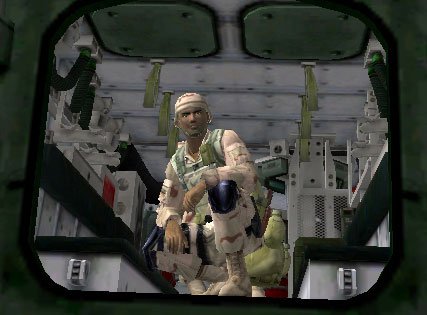

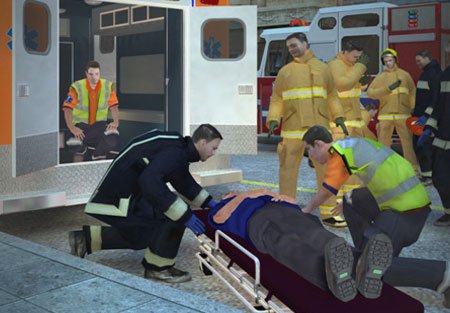
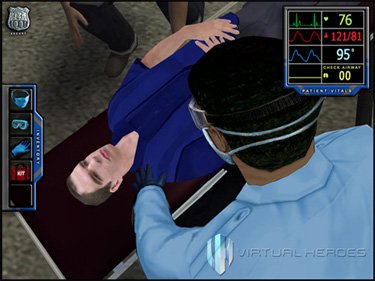
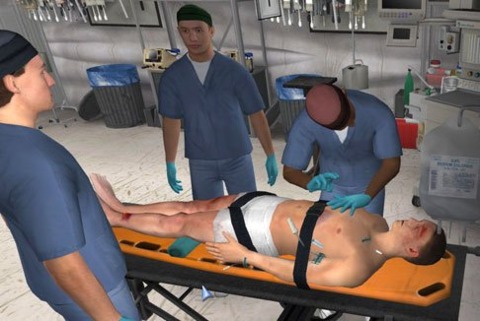
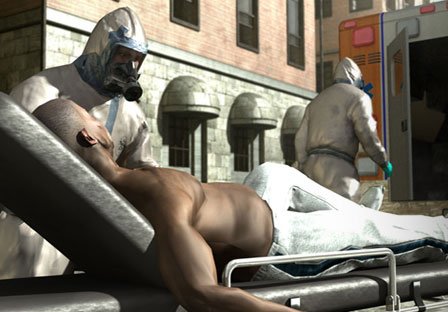
Join the conversation